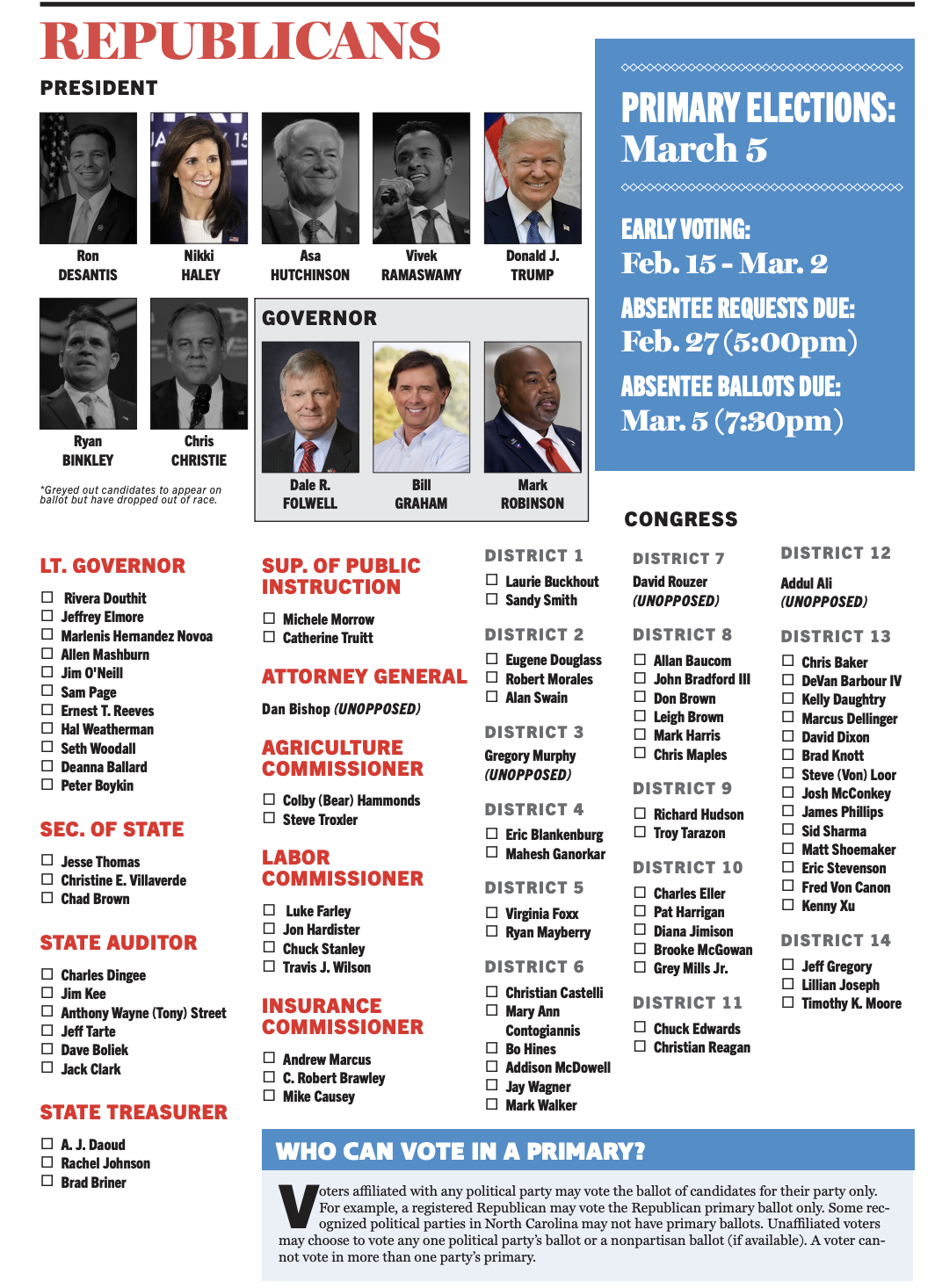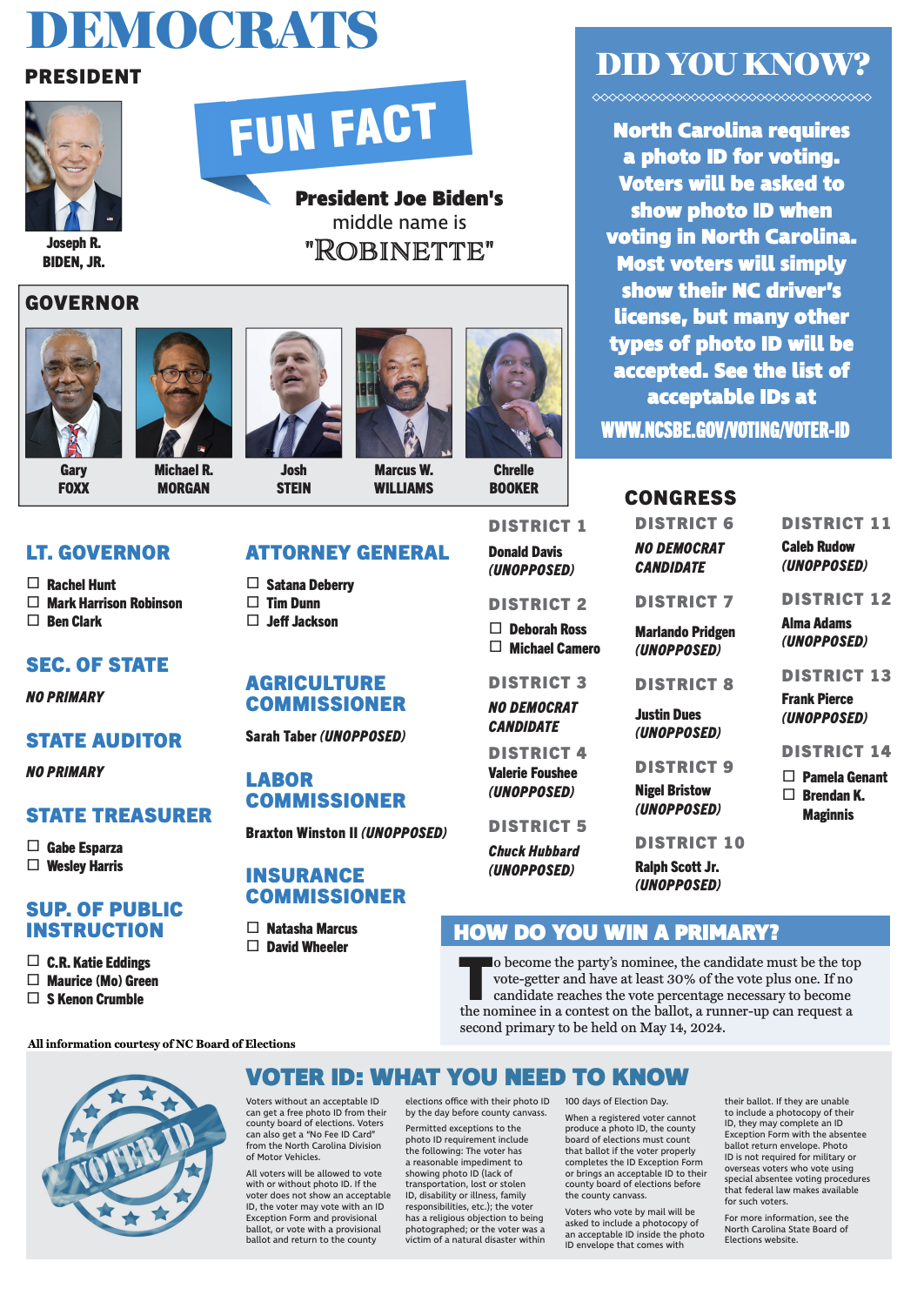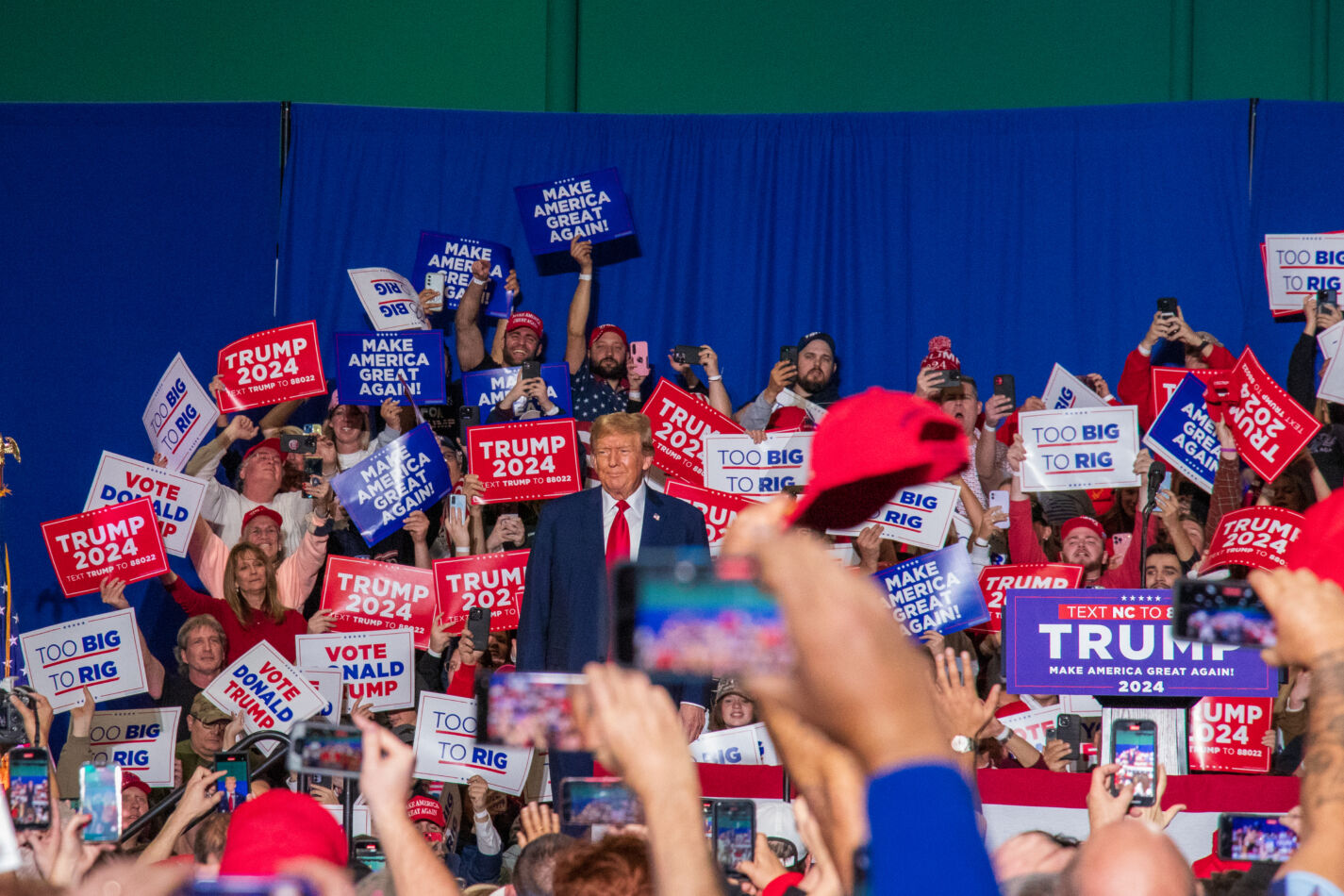It is a warm Super Tuesday in North Carolina. Temperatures in the 70s for much of the state make it a good day for high turnout in the primary elections. In mail-in and early voting this year, 690,280 primary ballots have already been cast.
Almost 2,600 polling places across the state will be open from 6:30 am to 7:30 on Tuesday evening. Voters in line at 7:30 pm will be allowed to cast a ballot. Voter ID is the law in North Carolina, but forms will be available at polling places to explain why a voter does not have one.
when wILL we know results?
Carolina Journal will be reporting results as they become available. Still, Andy Jackson of the John Locke Foundation’s Civitas Center for Public Integrity says results could come a little later in the evening than in past years, closer to 9 pm or so, because of a change to state elections law this year that says counties may begin counting early voting AFTER polls close, rather than before.
According to the North Carolina State Board of Elections, after the polls close at 7:30 pm, the early voting results will begin to be reported. That would include in-person early votes and absentee by-mail votes approved by county boards of elections. In the two hours after the polls close, precinct officials will hand-deliver results to their county board of elections. Between 8:30 and midnight, precinct results are reported, and results will be continually updated on the NCSBE Election Results Dashboard. Ten days after the election, following the county canvass process and counting military and overseas absentee ballots, the results are certified by county boards.
“We will also know the winner of almost every race by midnight on election night, just as we did under the old law,” explains Jackson. “The only real difference is that the pronounced red shift we are used to seeing will diminish. That is because, rather than having almost all early votes reported first, and almost all Election Day votes reported later, both early and Election Day tabulations will be released over the course of the evening.”
High-stakes primaries
North Carolina joins 15 other states in holding primary elections on March 5: Alabama, Alaska, Arkansas, California, Colorado, Maine, Massachusetts, Minnesota, Oklahoma, Tennessee, Texas, Utah, Vermont, and Virginia. More than one-third of all Republican and Democratic presidential nomination delegates will be determined on Super Tuesday: 865 Republican delegates are up for grabs and 1,420 Democratic delegates. GOP frontrunner and former president Donald Trump currently has 247 delegates, and President Joe Biden, a Democrat, has 206.
In addition to the presidential primary, North Carolina voters will have primaries in Republican and Democratic governor’s races, lieutenant governor, several other statewide Council of State races, congressional seats, and the state legislature.
North Carolina’s primary is semi-closed, meaning that party-affiliated voters can only vote in their own party’s primary, but unaffiliated voters, the state’s largest group, can vote in any primary. Eleven of the other Super Tuesday states have open primaries where all voters can vote in any one primary they want to.
Who will be on the ballot?
Over the weekend, Republican presidential candidates Nikki Haley and Donald Trump visited North Carolina, with Haley in Charlotte and Raleigh, and Trump in Greensboro. Vice President Kamala Harris came to heavily blue Durham, appearing with Gov. Roy Cooper on Friday. The high-profile get-out-the-vote visits indicate that the state will remain a key target ahead of November’s general election.
Voters can see their sample ballot ahead of time by visiting the North Carolina State Board of Elections. In most areas of the state, the GOP has more primaries, so Republican voters will see more races on their ballots than Democrat voters. There are several avenues to getting on the presidential primary ballot, including candidates’ names submitted by their recognized party or unaffiliated candidates collecting signatures from voters.
The State Board of Elections finalized the presidential primary ballot in January, so there will be some candidates on Tuesday’s GOP ballot who have already dropped out of the race. For example, Ron DeSantis, Chris Christie, and Vivek Ramaswamy have all suspended their campaigns but will appear on GOP ballots.


ten tips from ncsbe
The North Carolina State Board of Election offers these 10 tips for casting ballots in person on Election Day:
- Know the rules for a primary election. Primaries are elections used to determine each political party’s nominees who will advance to the general election in November. In a partisan primary, voters affiliated with a political party may only vote their party’s ballot and may not vote in another party’s primary. Unaffiliated voters may choose any one political party’s ballot or a nonpartisan ballot, if available in their jurisdiction. There are Democratic, Republican, and Libertarian primaries in our state this year. An unaffiliated voter may choose to participate in one of these party primaries, while a voter who is registered as a Democrat, Republican, or Libertarian will receive their party’s ballot. For more information, see Upcoming Election.
- Go to your assigned polling place on Election Day. Statewide, nearly 2,600 polling places will be open from 6:30 a.m. to 7:30 p.m. on Tuesday. Voters in line at 7:30 p.m. will be able to cast a ballot. To find your polling place, use the Voter Search tool on the State Board’s website, ncsbe.gov.
- Find your sample ballot. Voters can use the State Board’s Voter Search tool to locate their sample ballot. The ballot shows the contests that you’ll be voting on. Using Voter Search, pull up your voter record, then scroll down to the “Your Sample Ballot” section.
- Bring your photo ID. You will be asked to show photo ID at your polling place when you check in to vote. Most voters will simply show their driver’s license, but there are many other acceptable photo IDs. For more information, including the full list of acceptable IDs, visit bringitnc.com. Voters who do not have photo ID when they vote can make sure their vote counts by either (1) filling out a form explaining why they are unable to show ID, or (2) showing their ID at their county board of elections office by 5 p.m. March 14, the ninth day after the election.
- Voters may not register on Election Day in North Carolina. While that is the general rule, voters who become eligible after the regular voter registration deadline, either due to becoming a U.S. citizen or having their rights restored following a felony conviction, are still permitted to register on Election Day.
- If you need assistance, request it at your polling place. Curbside voting is available for voters who are unable to enter the voting place without assistance due to age or disability. Once inside the polling place, voters who experience difficulties should request help from an election worker. For more information, see Help for Voters with Disabilities.
- State and federal laws forbid intimidation or interference with voters. This includes hindering access to the voting place, whether inside or outside the voting site. It is also a crime to interfere with election officials carrying out their duties. Penalties for violations include prison time, a fine, or both. The State Board takes these incidents very seriously. When they occur, we will work with our law enforcement partners to respond. Voters who are harassed or intimidated should notify an election official immediately.
- Election results will be posted on the State Board’s website. See the Election Results Dashboard. See also the Election Night Reporting Timeline for information on when the public can expect unofficial results on election night.
- If you still plan to vote an absentee ballot, act fast. The deadline to have your ballot delivered to the county board of elections is 7:30 p.m. on Tuesday, Election Day. If you are unsure that the postal service or another delivery service will deliver your ballot by Tuesday, you can instead drop it off at your county board of elections office during business hours, or at an early voting site through 3 p.m. Saturday, when early voting ends. Or you can decide to vote in person on Election Day, and discard your absentee ballot.
- If you’re participating in the election — as a voter, poll worker, observer, or campaigner — please treat others with dignity and respect. We know the political climate in our country is tense. But let’s make North Carolina a model for accessible, safe, secure, and accurate elections.
In order to avoid a runoff, primary candidates must win 30% of the vote, plus one. In cases where no candidate reaches that threshold, the second-place primary candidate can call for a runoff. The State Board of Elections has set runoff elections for May 14, while North Carolina’s general election is slated for Nov. 5.

